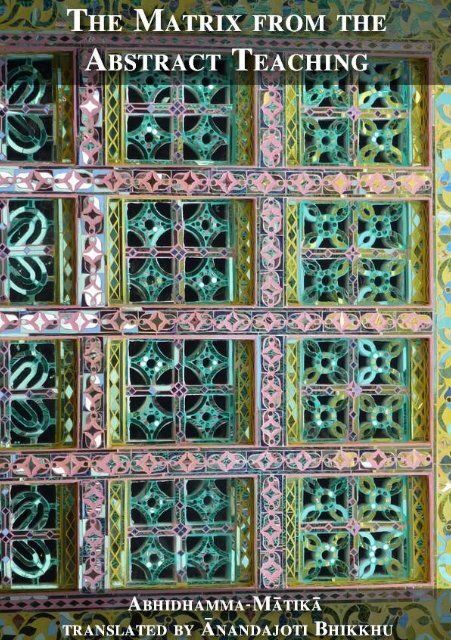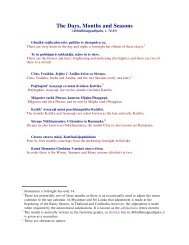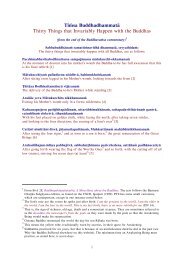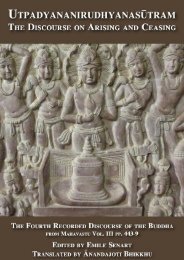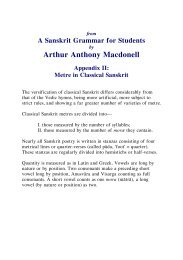The Matrix from the Abstract Teaching - Ancient Buddhist Texts
The Matrix from the Abstract Teaching - Ancient Buddhist Texts
The Matrix from the Abstract Teaching - Ancient Buddhist Texts
- No tags were found...
Create successful ePaper yourself
Turn your PDF publications into a flip-book with our unique Google optimized e-Paper software.
<strong>The</strong> <strong>Matrix</strong> <strong>from</strong> <strong>the</strong> <strong>Abstract</strong> <strong>Teaching</strong><br />
(Abhidhamma-Mātikā <strong>from</strong> Dhammasaṅgaṇī)<br />
Translated by Ānandajoti Bhikkhu<br />
(2nd revised edition, June, 2011/2055)
Table of Contents<br />
[<strong>The</strong> Triplets <strong>Matrix</strong>].....3<br />
[<strong>The</strong> Pairs <strong>Matrix</strong>].....9<br />
[<strong>The</strong> Roots Collection].....9<br />
[<strong>The</strong> Lesser Pairs].....10<br />
[<strong>The</strong> Pollutants Collection].....11<br />
[<strong>The</strong> Fetters Collection].....12<br />
[<strong>The</strong> Knots Collection].....13<br />
[<strong>The</strong> Floods Collection].....14<br />
[<strong>The</strong> Yokes Collection].....15<br />
[<strong>The</strong> Hindrances Collection].....16<br />
[<strong>The</strong> Adherences Collection].....17<br />
[<strong>The</strong> Greater Pairs].....18<br />
[<strong>The</strong> Attachments Collection].....20<br />
[<strong>The</strong> Defilements Collection].....21<br />
[<strong>The</strong> End Pairs].....22<br />
[<strong>The</strong> Pairs <strong>Matrix</strong> <strong>from</strong> <strong>the</strong> Discourses].....24
Preface<br />
This work stands at <strong>the</strong> beginning of <strong>the</strong> Abhidhamma, and is used as<br />
a tabulation against which various mental factors which are examined<br />
in <strong>the</strong> early sections of <strong>the</strong> <strong>Abstract</strong> <strong>Teaching</strong> are measured. <strong>The</strong><br />
Dhammasaṅgaṇī itself is, in large part, an explanation of <strong>the</strong> first<br />
three items in <strong>the</strong> list (on wholesome and unwholesome things and<br />
things without consequences).<br />
I hope to expand <strong>the</strong> present work at some point to include <strong>the</strong><br />
explanations of <strong>the</strong> matrix that are given in <strong>the</strong> Nikkhepakaṇḍa and<br />
Aṭṭhakathā sections of Dhammasaṅgaṇī.<br />
In 2011 I revised <strong>the</strong> Analysis of Mindfulness and this required a<br />
revision of this material also. I have also now included simplified<br />
footnotes in <strong>the</strong> English version in line with my current practice.<br />
Ānandajoti Bhikkhu<br />
October 2011<br />
Translations consulted:<br />
<strong>Buddhist</strong> Psychological Ethics, by Mrs C.A.F. Rhys Davids,<br />
translation and study of Dhammasaṅgaṇī, Pali Text Society, 1900, 3rd<br />
ed. reprinted Oxford, 1993.<br />
<strong>The</strong> Dhammasaṅganī, Enumeration of Ultimate Realities, by U<br />
Kyaw Khine, DPPS, Yangon, C.E. 1996 = B.E. 2539.
3<br />
[<strong>The</strong> <strong>Matrix</strong> <strong>from</strong> <strong>the</strong> <strong>Abstract</strong> <strong>Teaching</strong>]<br />
[<strong>The</strong> Triplets <strong>Matrix</strong>]<br />
[1] Wholesome things,<br />
Unwholesome things,<br />
Things without consequences. 1<br />
[2] Things connected with pleasant feeling<br />
Things connected with painful feeling<br />
Things connected with nei<strong>the</strong>r painful nor pleasant feeling<br />
[3] Things with results<br />
Things that have resultant nature 2<br />
Things that are nei<strong>the</strong>r results nor have resultant nature 3<br />
1 Aṭṭhasālinī has this interesting explanation of this sequence: what has <strong>the</strong><br />
characteristic of having faultless and pleasant result is wholesome, what has<br />
<strong>the</strong> characteristic of having faulty and painful result is unwholesome, what<br />
has <strong>the</strong> characteristic of no result is without consequence. For this meaning,<br />
see SED: á-vyākṛta, mfn. undeveloped, unexpounded... I follow <strong>the</strong> first<br />
meaning, but PED follows <strong>the</strong> second meaning and translates as<br />
unexplained, not decided, not declared, indeterminate and misses <strong>the</strong> point<br />
here.<br />
2 <strong>The</strong> Nikkhepakaṇḍa section of Dhammasaṅgaṇī paraphrases with<br />
vipākasabhāvadhammā; things that by <strong>the</strong>ir own nature are resultant.
<strong>The</strong> Triplets <strong>Matrix</strong> - 4<br />
[4] Things that are attached to and favourable to <strong>the</strong> attachments<br />
Things that are not attached to (but) are favourable to <strong>the</strong> attachments<br />
Things that are not attached to and are not favourable to <strong>the</strong><br />
attachments<br />
[5] Things that are defiled and connected with <strong>the</strong> defilements<br />
Things that are not defiled (but) are connected with <strong>the</strong> defilements<br />
Things that are not defiled and are not connected with <strong>the</strong> defilements<br />
[6] Things that are with thinking and reflection<br />
Things that are without thinking (but) have reflection alone<br />
Things that are without thinking and without reflection<br />
[7] Things that are united with joyful interest<br />
Things that are united with pleasure<br />
Things that are united with equanimity<br />
3 <strong>The</strong> Nikkhepakaṇḍa says this phrase means: whatever actions that are<br />
nei<strong>the</strong>r wholesome nor unwholesome, all form, and <strong>the</strong> element without<br />
processes (i.e. nibbāna).
<strong>The</strong> Triplets <strong>Matrix</strong> - 5<br />
[8] Things that are to be given up through vision (of <strong>the</strong> First Path) 4<br />
Things that are to be given up through development (of <strong>the</strong> rest of <strong>the</strong><br />
Paths) 5<br />
Things that are to be given up nei<strong>the</strong>r through vision (of <strong>the</strong> First<br />
Path) nor through development (of <strong>the</strong> rest of <strong>the</strong> Paths)<br />
[9] Things that have roots that are to be given up through vision (of<br />
<strong>the</strong> First Path)<br />
Things that have roots that are to be given up through development<br />
(of <strong>the</strong> rest of <strong>the</strong> Paths)<br />
Things that have roots that are nei<strong>the</strong>r to be given up through vision<br />
(of <strong>the</strong> First Path) nor through development (of <strong>the</strong> rest of <strong>the</strong> Paths)<br />
[10] Things that go towards increase 6<br />
Things that go towards decrease 7<br />
Things that go towards nei<strong>the</strong>r decrease nor increase<br />
4 Aṭṭhasālinī: through vision means through <strong>the</strong> (vision of <strong>the</strong>) Path of Stream<br />
Entry.<br />
5 Aṭṭhasālinī: through development means through <strong>the</strong> (development of <strong>the</strong>)<br />
o<strong>the</strong>r three Paths.<br />
6 Aṭṭhasālinī: this is a name for <strong>the</strong> rolling on of destinations through <strong>the</strong><br />
death relinking (consciousness).<br />
7 Aṭṭhasālinī: this is a designation for <strong>the</strong> Noble Paths.
<strong>The</strong> Triplets <strong>Matrix</strong> - 6<br />
[11] Those in training 8<br />
Those no longer in training<br />
Those nei<strong>the</strong>r in training nor no longer in training<br />
[12] Things that are limited<br />
Things that are very great<br />
Things that are immeasurable 9<br />
[13] Things that are limited sense-objects<br />
Things that are very great sense-objects<br />
Things that are immeasurable sense-objects<br />
[14] Things that are inferior<br />
Things that are middling<br />
Things that are excellent<br />
8 Sekhā, those in training, are those on one or o<strong>the</strong>r of <strong>the</strong> Noble paths or<br />
fruitions, with <strong>the</strong> exception of Arahants, who are known as asekhā, those<br />
who are no longer in training; those who are nei<strong>the</strong>r in training nor no<br />
longer training are ordinary folk (puthujjanā) who have not attained <strong>the</strong><br />
Paths or <strong>the</strong> Fruits.<br />
9 Aṭṭhasālinī: measureable things like passion and so on are called<br />
measureable, whe<strong>the</strong>r <strong>from</strong> sense-objects or <strong>from</strong> association, <strong>the</strong>se are not<br />
measureable, <strong>the</strong>y are opposed to <strong>the</strong> measureable, <strong>the</strong>refore <strong>the</strong>y are<br />
immeasureable.
<strong>The</strong> Triplets <strong>Matrix</strong> - 7<br />
[15] Things that are wrongful and have a fixed destiny<br />
Things that are righteous and have a fixed destiny<br />
Things that do not have a fixed destiny 10<br />
[16] Things that have Path as <strong>the</strong>ir objects<br />
Things that have Path as <strong>the</strong>ir roots<br />
Things that have Path as <strong>the</strong>ir predominant (factor)<br />
[17] Things that have arisen<br />
Things that have not arisen<br />
Things that are arising<br />
[18] Things that are past<br />
Things that are future<br />
Things that are present<br />
[19] Things that are past objects<br />
Things that are future objects<br />
Things that are present objects<br />
10 According to <strong>the</strong> Nikkhepakaṇḍa, <strong>the</strong>re are five acts that are wrongful and<br />
have a fixed destiny beginning with matricide (and including patricide,<br />
killing a Arahat, drawing <strong>the</strong> blood of a Buddha, and making a schism in<br />
<strong>the</strong> Saṅgha); <strong>the</strong> four Paths and Nibbāna are righteous and have a fixed<br />
destiny; o<strong>the</strong>r things do not have a fixed destiny.
<strong>The</strong> Triplets <strong>Matrix</strong> - 8<br />
[20] Things that are his own 11<br />
Things that are ano<strong>the</strong>r’s<br />
Things that are his own and ano<strong>the</strong>r’s<br />
[21] Things that are internal objects<br />
Things that are external objects<br />
Things that are internal and external objects<br />
[22] Things that are visible and have impingement 12<br />
Things that are not visible and have impingement<br />
Things that are not visible and do not have impingement<br />
<strong>The</strong> Triplets <strong>Matrix</strong><br />
11 Nikkhepakaṇḍa: whatever things for <strong>the</strong> various beings are one’s own,<br />
individual, constantly and personally attached to: form, feelings, perception,<br />
processes, and consciousness.<br />
12 Aṭṭhasālinī: what is reckoned as having a visible nature ... (that is) visible;<br />
what is reckoned as having a striking nature ... (that has) impingement.
9<br />
[<strong>The</strong> Pairs <strong>Matrix</strong>]<br />
[<strong>The</strong> Roots Collection] 13<br />
[1] Things that are roots, things that are not roots<br />
[2] Things that are connected with roots, things that are unconnected<br />
with roots<br />
[3] Things that are associated with roots, things that are unassociated<br />
with roots<br />
[4] Things that are roots and connected with roots, things that are<br />
connected with roots (but) are not roots<br />
[5] Things that are roots and associated with roots, things that are<br />
associated with roots (but) are not roots<br />
[6] Things that are not roots but are connected with roots, things that<br />
are unconnected with roots<br />
<strong>The</strong> Roots Collection<br />
13 I have included <strong>the</strong> headings at <strong>the</strong> beginning of <strong>the</strong> section <strong>the</strong>y refer to<br />
in order to clarify what follows. <strong>The</strong>y appear only as end-titles in Dhs.
<strong>The</strong> Pairs <strong>Matrix</strong> - 10<br />
[<strong>The</strong> Lesser Pairs]<br />
[7] Things with causes, things without causes<br />
[8] Things that are conditioned, things that are not conditioned<br />
[9] Things that are visible, things that are not visible.<br />
[10] Things that are impingements, things that are not impingements.<br />
[11] Things that have form, things that are formless.<br />
[12] Things that are mundane, things that are supermundane.<br />
[13] Things that are perceptible in one way, things that are not<br />
perceptible in ano<strong>the</strong>r way.<br />
<strong>The</strong> Lesser Pairs
<strong>The</strong> Pairs <strong>Matrix</strong> - 11<br />
[<strong>The</strong> Pollutants Collection]<br />
[14] Things that are pollutants, things that are not pollutants. 14<br />
[15] Things that are connected with pollutants, things that are<br />
unconnected with pollutants.<br />
[16] Things that are associated with pollutants, things that are<br />
unassociated with pollutants.<br />
[17] Things that are pollutants and are connected with pollutants,<br />
things that are connected with pollutants but are not pollutants.<br />
[18] Things that are pollutants and associated with pollutants, things<br />
that are associated with pollutants but are not pollutants.<br />
[19] Things that are unassociated with pollutants but are connected<br />
with pollutants, things that are unconnected with pollutants.<br />
<strong>The</strong> Pollutants Collection<br />
14 In <strong>the</strong> Abhidhamma <strong>the</strong>re are listed as four: <strong>the</strong> pollutants of sense-desire<br />
(kāmāsava); (desiring) continuation (bhavāsava); (wrong) views (diṭṭhāsava)<br />
and ignorance (avijjāsava); in <strong>the</strong> discourses wrong views is normally left<br />
out.
<strong>The</strong> Pairs <strong>Matrix</strong> - 12<br />
[<strong>The</strong> Fetters Collection]<br />
[20] Things that are fetters, things that are not fetters. 15<br />
[21] Things that are favourable to <strong>the</strong> fetters, things that are<br />
unfavourable to <strong>the</strong> fetters.<br />
[22] Things that are associated with <strong>the</strong> fetters, things that are<br />
unassociated with <strong>the</strong> fetters.<br />
[23] Things that are fetters and favourable to <strong>the</strong> fetters,<br />
things that are favourable to <strong>the</strong> fetters but are not fetters.<br />
[24] Things that are fetters and associated with fetters,<br />
things that are associated with fetters but are not fetters.<br />
[25] Things that are unassociated with fetters but are favourable to <strong>the</strong><br />
fetters, things that are unfavourable to <strong>the</strong> fetters.<br />
<strong>The</strong> Fetters Collection<br />
15 Normally ten fetters are mentioned: embodiment view (sakkāyadiṭṭhi),<br />
doubt (vicikicchā), grasping at virtue and practices (sīlabbataparāmāsa),<br />
passion for sensuality (kāmarāga), ill-will (vyāpāda), passion for <strong>the</strong> form<br />
worlds (rūparāga), passion for <strong>the</strong> formless worlds (arūparāga), conceit<br />
(māna), agitation (uddhacca) and ignorance (avijjā).
<strong>The</strong> Pairs <strong>Matrix</strong> - 13<br />
[<strong>The</strong> Knots Collection]<br />
[26] Things that are knots, things that are not knots 16<br />
[27] Things that are favourable to <strong>the</strong> knots, things that are<br />
unfavourable to <strong>the</strong> knots<br />
[28] Things that are associated with knots, things that are unassociated<br />
with knots<br />
[29] Things that are knots and favourable to <strong>the</strong> knots, things that are<br />
favourable to <strong>the</strong> knots but are not knots<br />
[30] Things that are knots and associated with knots, things that are<br />
associated with knots but are not knots<br />
[31] Things that are unconnected with knots but favourable to <strong>the</strong><br />
knots, things that are unfavourable to <strong>the</strong> knots<br />
<strong>The</strong> Knots Collection<br />
16 <strong>The</strong>re are four: <strong>the</strong> knots of avarice (abhijjhā); ill-will (vyāpāda); grasping<br />
at virtue and practices (sīlabbataparāmāsa); adherence to ’this is <strong>the</strong> truth’<br />
(idaṁsaccābhinivesa).
<strong>The</strong> Pairs <strong>Matrix</strong> - 14<br />
[<strong>The</strong> Floods Collection]<br />
[32] Things that are floods, things that are not floods 17<br />
[33] Things that are favourable to <strong>the</strong> floods, things that are<br />
unfavourable to <strong>the</strong> floods<br />
[34] Things that are associated with floods, things that are<br />
unassociated with floods<br />
[35] Things that are floods and favourable to <strong>the</strong> floods, things that<br />
are favourable to <strong>the</strong> floods but are not floods<br />
[36] Things that are floods and associated with floods, things that are<br />
associated with floods but are not floods<br />
[37] Things that are unassociated with floods but favourable to <strong>the</strong><br />
floods, things that are unfavourable to <strong>the</strong> floods<br />
<strong>The</strong> Floods Collection<br />
17 <strong>The</strong>se are <strong>the</strong> similar to <strong>the</strong> pollutants above: <strong>the</strong> floods of sense-desire<br />
(kāmogha), (desiring) continuation (bhavogha), (wrong) views (diṭṭhogha)<br />
and ignorance (avijjogha).
<strong>The</strong> Pairs <strong>Matrix</strong> - 15<br />
[<strong>The</strong> Yokes Collection]<br />
[38] Things that are yokes, things that are not yokes 18<br />
[39] Things that are favourable to <strong>the</strong> yokes, things that are<br />
unfavourable to <strong>the</strong> yokes<br />
[40] Things that are associated with yokes, things that are<br />
unassociated with yokes<br />
[41] Things that are yokes and favourable to <strong>the</strong> yokes, things that are<br />
favourable to <strong>the</strong> yokes but are not yokes<br />
[42] Things that are yokes and associated with yokes, things that are<br />
associated with yokes but are not yokes<br />
[43] Things that are unassociated with yokes but favourable to <strong>the</strong><br />
yokes, things that are unfavourable to <strong>the</strong> yokes<br />
<strong>The</strong> Yokes Collection<br />
18 <strong>The</strong>se are <strong>the</strong> similar to <strong>the</strong> pollutants above: <strong>the</strong> yokes of sense-desire<br />
(kāmayoga), (desiring) continuation (bhavayoga), (wrong) views (diṭṭhiyoga)<br />
and ignorance (avijjāyoga).
<strong>The</strong> Pairs <strong>Matrix</strong> - 16<br />
[<strong>The</strong> Hindrances Collection]<br />
[44] Things that are hindrances, things that are not hindrances 19<br />
[45] Things that are favourable to <strong>the</strong> hindrances, things that are<br />
unfavourable to <strong>the</strong> hindrances<br />
[46] Things that are associated with hindrances, things that are<br />
unassociated with hindrances<br />
[47] Things that are hindrances and favourable to <strong>the</strong> hindrances,<br />
things that are favourable to <strong>the</strong> hindrances but are not hindrances<br />
[48] Things that are hindrances and associated with hindrances, things<br />
that are associated with hindrances but are not hindrances<br />
[49] Things that are unassociated with hindrances but favourable to<br />
<strong>the</strong> hindrances, things that are unfavourable to <strong>the</strong> hindrances<br />
<strong>The</strong> Hindrances Collection<br />
19 Five in number: sensual desire (kāmacchanda), ill-will (vyāpāda), sloth and<br />
torpor (thīnamiddha), agitation and worry (uddhaccakukkucca), skeptical<br />
doubt (vicikicchā).
<strong>The</strong> Pairs <strong>Matrix</strong> - 17<br />
[<strong>The</strong> Adherences Collection]<br />
[50] Things that are adherences, things that are not adherences 20<br />
[51] Things that are adhered to, things that are not adhered to 21<br />
[52] Things that are associated with adherences, things that are<br />
unassociated with adherences<br />
[53] Things that are adherences and adhered to, things that are<br />
adhered to but are not adherences<br />
[54] Things that are unassociated with adherences but adhered to,<br />
things that are not adhered to 22<br />
<strong>The</strong> Adherences Collection<br />
20 <strong>The</strong>se are defined as being adherence to <strong>the</strong> wrong views that <strong>the</strong> world is<br />
eternal or not eternal; finite or infinite; <strong>the</strong> soul and <strong>the</strong> body are <strong>the</strong> same<br />
or not <strong>the</strong> same; <strong>the</strong> individual exists or doesn’t exist after death; <strong>the</strong><br />
individual both exists and does not exist after death or nei<strong>the</strong>r exists nor<br />
does not exist after death.<br />
21 Aṭṭhasālinī: because of <strong>the</strong>ir taking objects with adherence (<strong>the</strong>re is)<br />
adherence to, (<strong>the</strong>refore) adhered to (is said).<br />
22 This doesn’t quite follow <strong>the</strong> same scheme as <strong>the</strong> o<strong>the</strong>r defilements set out<br />
above, following which we might have expected: things that are adherences<br />
and associated with adherences, etc. because <strong>the</strong> adherences have only one<br />
object, (wrong) view (diṭṭhi). I owe this explanation to Bhikkhu Bodhi.
<strong>The</strong> Pairs <strong>Matrix</strong> - 18<br />
[<strong>The</strong> Greater Pairs]<br />
[55] Things that are with sense-objects, things that are without senseobjects<br />
[56] Things that are consciousness, things that are not consciousness 23<br />
[57] Things that are mental factors, things that are not mental factors<br />
[58] Things that are associated with mind, things that are unassociated<br />
with mind<br />
[59] Things that are joined with mind, things that are not joined with<br />
mind<br />
[60] Things that are produced by mind, things that are not produced<br />
by mind<br />
[61] Things that are developed by mind, things that are not developed<br />
by mind<br />
23 <strong>The</strong>se are defined as being adherence to <strong>the</strong> wrong views that <strong>the</strong> world is<br />
eternal or not eternal; finite or infinite; <strong>the</strong> soul and <strong>the</strong> body are <strong>the</strong> same<br />
or not <strong>the</strong> same; <strong>the</strong> individual exists or doesn’t exist after death; <strong>the</strong><br />
individual both exists and does not exist after death or nei<strong>the</strong>r exists nor<br />
does not exist after death.
<strong>The</strong> Pairs <strong>Matrix</strong> - 19<br />
[62] Things that are kept rolling by mind, things that are not kept<br />
rolling by mind<br />
[63] Things that are productions produced by mind, things that are not<br />
productions produced by mind<br />
[64] Things that are productions that are produced by mind and<br />
developed by mind, things that are not productions that are produced<br />
by mind and developed by mind<br />
[65] Things that are productions that are produced by mind and kept<br />
rolling by mind, things that are not productions that are produced by<br />
mind and kept rolling by mind<br />
[66] Things that are internal, things that are external<br />
[67] Things that are derived, things that are not derived<br />
[68] Things that are attached to, things that are not attached to<br />
<strong>The</strong> Greater Pairs
<strong>The</strong> Pairs <strong>Matrix</strong> - 20<br />
[<strong>The</strong> Attachments Collection]<br />
[69] Things that are attachments, things that are not attachments 24<br />
[70] Things that are favourable to <strong>the</strong> attachments, things that are<br />
unfavourable to <strong>the</strong> attachments<br />
[71] Things that are associated with <strong>the</strong> attachments, things that are<br />
unassociated with <strong>the</strong> attachments<br />
[72] Things that are attachments and favourable to <strong>the</strong> attachments,<br />
things that are favourable to <strong>the</strong> attachments but are not attachments<br />
[73] Things that are attachments and associated with <strong>the</strong> attachments,<br />
things that are associated with <strong>the</strong> attachments, but are not<br />
attachments<br />
[74] Things that are unassociated with <strong>the</strong> attachments but favourable<br />
to <strong>the</strong> attachments, things that are unfavourable to <strong>the</strong> attachments<br />
<strong>The</strong> Attachments Collection<br />
24 <strong>The</strong>re are four: attachments to sensuality (kāmupādāna), views<br />
(diṭṭhupādāna), grasping at virtue and practices (sīlabbatupādāna), self<strong>the</strong>ories<br />
(attavādupādāna).
<strong>The</strong> Pairs <strong>Matrix</strong> - 21<br />
[<strong>The</strong> Defilements Collection]<br />
[75] Things that are defilements, things that are not defilements 25<br />
[76] Things that are connected with <strong>the</strong> defilements, things that are<br />
unconnected with <strong>the</strong> defilements<br />
[77] Things that are defiled, things that are not defiled<br />
[78] Things that are associated with <strong>the</strong> defilements, things that are<br />
unassociated with <strong>the</strong> defilements<br />
[79] Things that are defilements and connected with <strong>the</strong> defilements,<br />
things that are connected with <strong>the</strong> defilements (but) are not<br />
defilements<br />
[80] Things that are defilements and defiled, things that are defiled,<br />
but are not defilements<br />
[81] Things that are defilements and associated with <strong>the</strong> defilements,<br />
things that are associated with defilements but are not defilements<br />
[82] Things that are unassociated with defilements but connected with<br />
<strong>the</strong> defilements, things that are unconnected with <strong>the</strong> defilements<br />
<strong>The</strong> Defilements Collection<br />
25 <strong>The</strong> defilements are here defined as ten: greed (lobha), hatred (dosa),<br />
delsuion (moha), conceit (māna), (wrong) views (diṭṭhi), doubt (vicikicchā),<br />
sloth (thīna), agitation (uddhacca), lack of conscience (ahirīka), lack of<br />
shame (anottappa).
<strong>The</strong> Pairs <strong>Matrix</strong> - 22<br />
[<strong>The</strong> End Pairs]<br />
[83] Things that are to be given up through vision (of <strong>the</strong> First Path),<br />
things that are not to be given up through vision (of <strong>the</strong> First Path)<br />
[84] Things that are to be given up through development (of <strong>the</strong> rest<br />
of <strong>the</strong> Paths), things that are not to be given up through development<br />
(of <strong>the</strong> rest of <strong>the</strong> Paths)<br />
[85] Things that are roots that are to be given up through vision (of<br />
<strong>the</strong> First Path), things that are not roots that are to be given up<br />
through vision (of <strong>the</strong> First Path).<br />
[86] Things that are roots that are to be given up through development<br />
(of <strong>the</strong> rest of <strong>the</strong> Paths), things that are not roots that are to be given<br />
up through development (of <strong>the</strong> rest of <strong>the</strong> Paths).<br />
[87] Things that are with thinking, things that are without thinking<br />
[88] Things that are with reflection, things that are without reflection<br />
[89] Things that are connected with joyful interest, things that are<br />
unconnected with joyful interest<br />
[90] Things that are united with joyful interest, things that are not<br />
united with joyful interest<br />
[91] Things that are united with pleasure, things that are not united<br />
with pleasure
<strong>The</strong> Pairs <strong>Matrix</strong> - 23<br />
[92] Things that are united with equanimity, things that are not united<br />
with equanimity<br />
[93] Things that are (connected with) <strong>the</strong> sensual realms, things that<br />
are not (connected with) <strong>the</strong> sensual realms<br />
[94] Things that are (connected with) <strong>the</strong> form realms, things that are<br />
not (connected with) <strong>the</strong> form realms<br />
[95] Things that are (connected with) <strong>the</strong> formless realms, things that<br />
are not (connected with) <strong>the</strong> formless realms<br />
[96] Things that are included, things that are unincluded 26<br />
[97] Things that lead out, things that do not lead out<br />
[98] Things that are fixed, things that are not fixed<br />
[99] Things that are surpassable, things that are unsurpassable<br />
[100] Things that are with faults, things that are without faults<br />
<strong>The</strong> End Pairs<br />
26 Aṭṭhasālinī: included means: included in, contained in, <strong>the</strong> round of <strong>the</strong><br />
three grounds (of existence); unincluded means not being included <strong>the</strong>rein.
24<br />
[<strong>The</strong> Pairs <strong>Matrix</strong> <strong>from</strong> <strong>the</strong> Discourses]<br />
[101] Things which partake of understanding, things which do not<br />
partake of understanding.<br />
[102] Things like lightning, things like thunder-bolts<br />
[103] Foolish things, wise things.<br />
[104] Dark things, bright things.<br />
[105] Things which cause remorse, things which do not cause remorse.<br />
[106] Things which are definitions, things within <strong>the</strong> range of<br />
definitions.<br />
[107] Things which are expressions, things within <strong>the</strong> range of<br />
expressions.<br />
[108] Things which are designations, things within <strong>the</strong> range of<br />
designations.<br />
[109] Name and form.<br />
[110] Ignorance and craving for continuation.<br />
[111] View about continuation and view about discontinuation.<br />
[112] View about eternalism and view about annihilation.
<strong>The</strong> Pairs <strong>Matrix</strong> <strong>from</strong> <strong>the</strong> Discourses - 25<br />
[113] View about finitude and view about infinity.<br />
[114] View about <strong>the</strong> beginning of things, view about <strong>the</strong> ending of<br />
things.<br />
[115] Lack of conscience and lack of shame.<br />
[116] Conscience and shame.<br />
[117] Difficulty in admonishment and association with <strong>the</strong> wicked.<br />
[118] Ease in admonishment and association with <strong>the</strong> good.<br />
[119] Skilful in what is an offence and skilful in rising <strong>from</strong> what is<br />
an offense.<br />
[120] Skilful in an attainment (of jhāna) and skilful in rising <strong>from</strong> an<br />
attainment (of jhāna).<br />
[121] Skilful in elements and skilful in applying <strong>the</strong> mind.<br />
[122] Skilful in <strong>the</strong> (sense) spheres and skilful in conditional<br />
origination.<br />
[123] Skilful in what is a cause and skilful in what is not a cause.<br />
[124] Uprightness and gentleness.<br />
[125] Patience and meekness.<br />
[126] Amity and courtesy.
<strong>The</strong> Pairs <strong>Matrix</strong> <strong>from</strong> <strong>the</strong> Discourses - 26<br />
[127] Non-guarding of <strong>the</strong> doors of <strong>the</strong> faculties and non-knowing <strong>the</strong><br />
measure in food.<br />
[128] Guarding of <strong>the</strong> doors of <strong>the</strong> faculties and knowing <strong>the</strong> measure<br />
in food.<br />
[129] Forgetfulness and lack of full knowledge.<br />
[130] Mindfulness and full knowledge.<br />
[131] Strengh in discrimination and strength in (mental) development.<br />
[132] Calm and insight.<br />
[133] <strong>The</strong> sign of calm and <strong>the</strong> sign of exertion.<br />
[134] Exertion and balance.<br />
[135] Failure in morality and failure in view.<br />
[136] Success in morality and success in view.<br />
[137] Purity in morality and purity in view.<br />
[138] Purity in morality and endeavour in regard to (right) view.<br />
[139] Spiritual anxiety towards what is a cause for anxiety and wise<br />
endeavour in regard to that anxiety.<br />
[140] Dissatisfaction with (only) doing good deeds and not lacking in<br />
endeavour.
<strong>The</strong> Pairs <strong>Matrix</strong> <strong>from</strong> <strong>the</strong> Discourses - 27<br />
[141] Understanding and freedom.<br />
[142] Knowledge regarding destruction (of <strong>the</strong> pollutants) and<br />
knowledge of what has not yet arisen.<br />
<strong>The</strong> Pairs <strong>Matrix</strong> <strong>from</strong> <strong>the</strong> Discourses<br />
<strong>The</strong> <strong>Matrix</strong> is Finished
<strong>The</strong> Pairs <strong>Matrix</strong> <strong>from</strong> <strong>the</strong> Discourses - 29<br />
This work stands at <strong>the</strong> beginning of <strong>the</strong> Abhidhamma, and is used<br />
as a tabulation against which various mental factors which are<br />
examined in <strong>the</strong> early sections of <strong>the</strong> <strong>Abstract</strong> <strong>Teaching</strong> are<br />
measured.<br />
http://www.ancient-buddhist-texts.net


